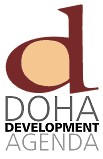 Doha Declaration
Doha DeclarationWTO Statement reaffirming and clarifying the TRIPS agreement - 2001
Third World countries were concerned about disputes related to access under the TRIPS agreement.
In 2001, a group of nations made a statement called the Doha Declaration (the WTO meeting was in Doha, Qatar) stating their interpretation of the TRIPS agreement. This language has been adopted by the WHO, so it is now official policy.
- TRIPS Agreement does not and should not prevent Members from taking measures to protect public health. Accordingly, while reiterating our commitment to the TRIPS Agreement, we affirm that the Agreement can and should be interpreted and implemented in a manner supportive of WTO Members' right to protect public health and, in particular, to promote access to medicines for all.
- Each Member has the right to grant compulsory licences and the freedom to determine the grounds upon which such licences are granted.
- Each Member has the right to determine what constitutes a national emergency or other circumstances of extreme urgency, it being understood that public health crises, including those relating to HIV⁄AIDS, tuberculosis, malaria and other epidemics, can represent a national emergency or other circumstances of extreme urgency.
- Under TRIPS and the Doha Declaration, nations have the sovereign right to “break” patents and can make patent systems of their own choosing
Initially intended to address 'medicine', but could apply to and is to date untested in regards to agriculture (food security), biopharming, etc.